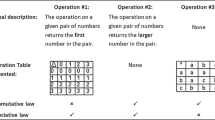Abstract
This paper examines two types of discourse in which teachers engage when discussing case studies based on classroom episodes, and the ways in which the availability of video data of these episodes may motivate a shift in the mode of discourse used. We interviewed two pairs of secondary school mathematics teachers after they had read a case study based on a 16-minute mathematics classroom episode taped in a secondary school in the United States. During each interview, a multimedia version of the case study, including video of the original episode, was available to the participants. We identify two modes of discourse engaged in by the teachers during the interviews: Grounded Narrative and Evaluative Discourse. We examine and identify the characteristics of the two discourse forms, drawn from both video and textual analysis. These characteristics are self-reflective talk, perspective, ethics, and linguistic patterns. The identification of two modes of discourse is relevant for researchers and teacher educators using case studies or video recordings. In addition, the findings provide insight into how teachers are “seeing” classroom events in a video case study.
Similar content being viewed by others
References
L.B. Barnes C.R. Christensen A.J. Hansen (1994) Teaching and the case method Harvard Business School Press Boston, Massachusetts
G.D. Fenstermacher (1994) The knower and the known: The nature of knowledge in research on teaching L.D. Hammond (Eds) Review of research in education American Educational Research Association Washington, DC 3–56
E. Goffman (1981) Forms of talk University of Pennsylvania Press Philadelphia
H.L. Harrington J.W. Garrison (1992) ArticleTitleCases as shared inquiry: A dialogical model for teacher preparation American Educational Research Journal 29 IssueID4 715–735
B. Jordan A. Henderson (1995) ArticleTitleInteraction analysis: Foundations and practice Journal of the Learning Sciences 4 IssueID1 39–103 Occurrence Handle10.1207/s15327809jls0401_2
Kennedy, M. (1997). How teachers connect research and practice. Mid-Western Educational Research, 10 (1).
Levin, B.B. (1993). Using the case method in teacher education: The role of discussion and experience in teachers’ thinking about cases. Unpublished Doctoral Dissertation, University of California–Berkeley, Berkeley, CA
K.K. Merseth (1996) Cases and case methods in teacher education J. Sikula (Eds) Handbook of research on teacher education: A project of the Association of Teacher Educators Macmillan Library Reference New York, NY 722–744
InstitutionalAuthorNameNational Research Council (2001) The power of video technology in international comparative research in education National Academy Press Washington, DC
M.J. Packer J.R. Mergendoller (1989) The development of practical social understanding in elementary school-age children L. T. Winegar (Eds) Social interaction and the development of children’s understanding Ablex Norwood, NJ 67–93
A.E. Richert (1991) Case methods and teacher education: Using cases to teach teacher reflection B.R. Tabachnik K. Zeichner (Eds) Issues and practices in inquiry-oriented teacher education Falmer London 130–150
Seago, N.M. (2000). Using video of classroom practice as a tool to study and improve teaching, Mathematics Education in the Middle Grades: Teaching to Meet the Needs of Middle Grades Learners and to Maintain High Expectations. Proceedings of National Convocation and Action Conference. Washington, DC: National Academy Press.
M.G. Sherin (2004) Redefining the role of video in teacher education J. Brophy (Eds) Using video in teacher education Elsevier Science New York, NY 1–27
J.H. Shulman (1991) ArticleTitleRevealing the mysteries of teacher-written cases: Opening the black box Journal of Teacher Education 42 IssueID4 250–262
L. Shulman (1986) ArticleTitleThose who understand: Knowledge growth in teaching Educational Researcher 15 IssueID2 4–14
L. Shulman (1992) Toward a pedagogy of cases J. H. Shulman (Eds) Case methods in teacher education Teachers College Press New York, NY 1–30
Solomon, J. & Nemirovsky, R. (in press). This is crazy. Differences of differences!” On the flow of ideas in a mathematical conversation. In D. Carraher and R. Nemirovsky (Eds.), Journal for Research in Mathematics Education VideoPaper Monograph (CD-rom special issue)
Sykes, G. & Bird, T. (1992). Teacher education and the case idea. In G. Grant (Ed.), Review of Research in Education (Vol. 18, pp. 457–521). Washington, DC: American Education Research Association.
Author information
Authors and Affiliations
Corresponding author
Rights and permissions
About this article
Cite this article
Nemirovsky, R., DiMattia, C., Ribeiro, B. et al. Talking About Teaching Episodes. J Math Teacher Educ 8, 363–392 (2005). https://doi.org/10.1007/s10857-005-3848-3
Issue Date:
DOI: https://doi.org/10.1007/s10857-005-3848-3




